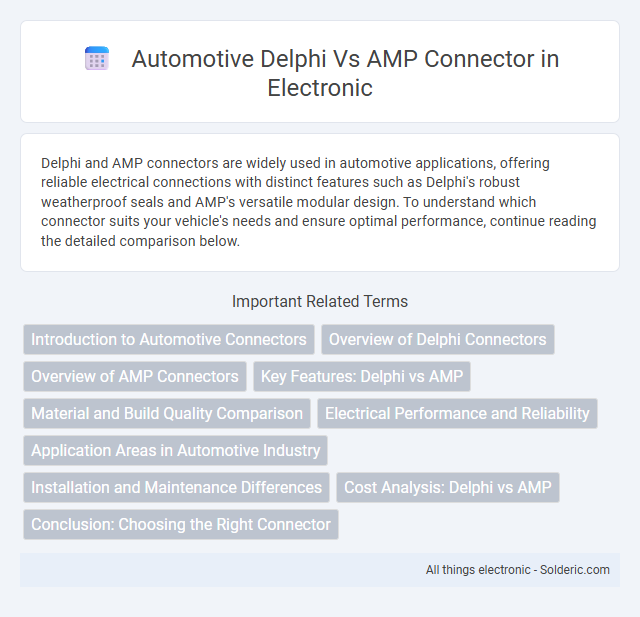Delphi and AMP connectors are widely used in automotive applications, offering reliable electrical connections with distinct features such as Delphi's robust weatherproof seals and AMP's versatile modular design. To understand which connector suits your vehicle's needs and ensure optimal performance, continue reading the detailed comparison below.
Comparison Table
| Feature | Delphi Automotive Connector | AMP Connector |
|---|---|---|
| Usage | Automotive wiring harnesses, engine, and body electronics | Automotive, industrial, and electronic applications |
| Connector Types | Multi-pin connectors, sealed and non-sealed options | Multi-pin, modular, sealed, and unsealed variants |
| Durability | High resistance to vibration, heat, and moisture | Robust against mechanical stress and environmental factors |
| Sealing | IP67 and higher sealing standards for waterproofing | Offers IP67 and IP68 sealing options |
| Material | High-grade thermoplastics and corrosion-resistant metals | Thermoplastics with corrosion-resistant metal contacts |
| Current Rating | Up to 20-40 A depending on connector type | Up to 25-40 A based on design |
| Ease of Assembly | Designed for automated and manual assembly processes | Supports quick-connect and sealed assembly |
| Brand Ownership | Delphi Technologies (now part of Aptiv) | TE Connectivity (AMP brand) |
Introduction to Automotive Connectors
Automotive connectors like Delphi and AMP are essential components designed to establish reliable electrical connections within vehicles, optimizing signal transmission and power distribution. Delphi connectors are known for their robust sealing, high durability, and compatibility with harsh automotive environments, ensuring long-lasting performance under vibration, temperature fluctuations, and moisture exposure. AMP connectors, part of TE Connectivity, offer a diverse range of connector solutions with modular designs, advanced locking mechanisms, and extensive pin configurations tailored to meet rigorous automotive industry standards.
Overview of Delphi Connectors
Delphi connectors in automotive applications are renowned for their robust design, weather resistance, and superior electrical performance, making them ideal for harsh environments. These connectors offer a variety of styles including sealed, non-sealed, and high-current options, ensuring compatibility with diverse vehicle systems. Your choice of Delphi connectors guarantees reliable signal and power transmission critical for advanced automotive functionality.
Overview of AMP Connectors
AMP connectors, widely used in automotive applications, offer reliable electrical connections for wire harnesses and electronic systems. Known for their robust design, AMP connectors provide high vibration resistance, ensuring stable performance in harsh environments. These connectors support a variety of wire sizes and configurations, enabling versatility in complex automotive electrical architectures.
Key Features: Delphi vs AMP
Delphi connectors offer robust sealing capabilities and high vibration resistance ideal for automotive applications requiring durability in harsh environments. AMP connectors, now under TE Connectivity, provide versatile modular designs with excellent electrical performance and ease of assembly for complex wiring systems. Both feature high-quality materials and industry-standard compliance, but Delphi excels in extreme condition resilience while AMP emphasizes design flexibility and integration.
Material and Build Quality Comparison
Delphi automotive connectors typically feature a high-grade thermoplastic housing combined with sealed and corrosion-resistant contacts, ensuring durability in harsh environments. AMP connectors, often constructed with robust polypropylene or nylon materials, emphasize precision-molded components and strong metal terminals for reliable electrical connections. Your choice hinges on balancing Delphi's reputation for weatherproof sealing against AMP's strength in mechanical resilience and contact integrity.
Electrical Performance and Reliability
Delphi automotive connectors exhibit superior electrical performance with enhanced conductivity and low contact resistance, ensuring stable signal transmission in harsh environments. AMP connectors provide reliable mechanical retention and corrosion resistance, maintaining connectivity under vibration and temperature extremes common in automotive applications. Both brands meet stringent industry standards, but Delphi often leads in high-current capabilities and advanced sealing technologies for long-term reliability.
Application Areas in Automotive Industry
Delphi connectors are extensively utilized in automotive applications requiring high vibration resistance and secure electrical connections, such as engine control units, fuel injection systems, and ABS modules. AMP connectors are favored in automotive interior and exterior lighting, infotainment systems, and door modules due to their compact size and ease of assembly. Both connector types play crucial roles in enabling reliable electrical signal and power transmission across various automotive subsystems.
Installation and Maintenance Differences
Delphi automotive connectors feature a robust sealing system and self-locking mechanisms that simplify installation, reducing the risk of water ingress and corrosion. AMP connectors prioritize quick-crimp technology and modular design, enabling faster assembly and easier pin replacement during maintenance. Your choice between Delphi and AMP should consider the balance between installation speed and long-term serviceability for optimal automotive performance.
Cost Analysis: Delphi vs AMP
Delphi connectors generally offer a higher initial cost compared to AMP connectors due to advanced sealing technologies and durability tailored for harsh automotive environments. AMP connectors provide a cost-effective alternative with widespread availability and simplified designs, making them suitable for applications with moderate environmental demands. Your choice between Delphi and AMP connectors should consider not only upfront expenses but long-term reliability and maintenance costs specific to your automotive project.
Conclusion: Choosing the Right Connector
Selecting the right connector between Automotive Delphi and AMP depends on specific vehicle requirements, environmental conditions, and electrical performance standards. Delphi connectors are renowned for their durability and resistance to harsh automotive environments, while AMP connectors offer versatility and ease of installation in complex wiring systems. Evaluating factors such as current rating, sealing capability, and compatibility with existing systems ensures optimal connector choice for reliable automotive applications.
Automotive Delphi vs AMP connector Infographic

 solderic.com
solderic.com